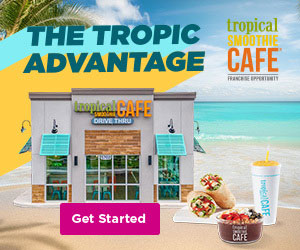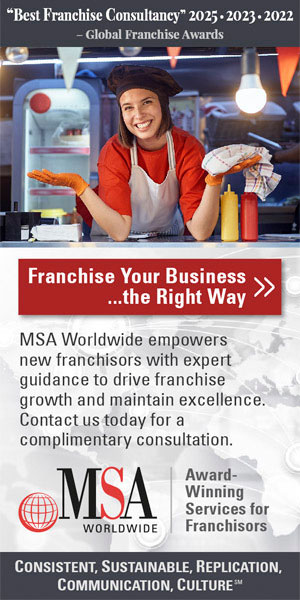Starting at the bottom has become a cliché, but this one really is true. Actually, Brian Greenley started as a customer of Maaco-sort of.
"Actually, starting with Maaco was an accident," Greenley says. "I was trying to get my car fixed, and a friend of mine was the manager of this Maaco location in Denver. He said, 'You come down after hours and we'll paint your car.' But that money did not go into the owner's pocket; it went into the manager's pocket."
Greenley learned a bunch of interesting lessons from that experience. One was what an opportunity there was in the shop. Another was the need for close management of a location to prevent losses. Another was the relationship with the customer.
"Customers want to buy your service," he says. "They aren't there because they had to be-because their transmission just went out, for example. There was quick turnaround, and the customer paid for it right there on the spot." So the receivables were low.
"I saw the opportunity right then."
Greenley, who was a 19-year-old kid with a high school diploma and no college, decided that he wanted to buy the Denver shop. He tried, but the owner didn't take him seriously.
"At first, his reaction was disbelief-I had to show him that I was trustworthy, which took a year," Greenley says. He did take a job as a sander. After a year, during which he worked his way up to manager, Greenley says "I finally pestered him enough. I said, 'You're letting me run this place anyway.'"
The persistence paid off; after a year he was able to buy a 10 percent interest. After two years, he bought the business with money he had made from summer jobs and a loan.
He went to the Maaco training school, came home and immediately went to work, making good money from day one. As he says, he had no option: "I didn't have a bankroll, I wasn't financed by anybody, my family wasn't wealthy. I had to make it happen. When I finished franchise school, I had $500 in my checking account and a $3,500 payroll due in five days."
As it turned out, making payroll was no problem. His very first week, Greenley had sales of $16,000, and things only got better from there. Before he bought the business, the Maaco shop produced $450,000 in gross revenue; with Greenley at the helm, revenue jumped to $800,000. Two years later, when Greenley was 22, the auto painting center became the first Maaco in Denver history to break a million dollars in sales.
Revenue increased to $1.6 million in Greenley's fifth year, as he bolstered his retail business with insurance work. (Greenley's auto painting center later became the first Maaco in company history to be a direct repair facility for one of the nation's largest insurance companies.)
By then, it was clear that the business was outgrowing his 9,000-square-foot facility. "I had only 13 parking spots," says Greenley. "To keep up with demand, I borrowed an idea from my manufacturing days and started a second 'graveyard' shift."
"My long-range goal was to do $3 million a year in sales," says Greenley, "so I just did the simple math. If I could generate $1.6 million in 9,000 square feet, why not just double the size of the facility? Some of the people at Maaco said they didn't recommend them that big, but they still helped design the building, the parking lot, the whole facility."
As it turned out, Tony Martino, company founder, and Greenley were right. The new Maaco center, a 16,000 square foot facility, produced more than $2 million in revenue for six consecutive years. In 2000, Greenley reached his goal of $3 million in sales.
His store this year broke a record: it grossed $1 million in 13 weeks, an average of 85 cars a day in a 15,000-square-foot facility. And this is in a standard 8:30-5:30 day.
In 2002, he added another location in Hawaii, where his manager and partner was Andy Riley, Greenley's former operations manager in Maaco.
Owning more than one unit was not a major goal for Greenley, and the only reason he did it was because Riley would be a partial owner who was excited to be working with one of the top local owners. Managing across that distance was "more moral" than anything else, he says, because Riley was vested "and wasn't going to walk. That's the only way to do it," Greenley says. "My recommendation is in most all cases of multi-unit ownership, stay close geographically."
Now Riley is the full owner of the Hawaiian location, and Greenley is no longer a multi-unit operator. He has strong opinions about it.
"I make more in one location than others can do in seven," he says. "They have that many more buildings, rent, and managers, and profitability is not as good because you're not right there looking after all the details."
It was, he says, what was causing problems for the original owner of his franchise. "It was simple to see what he was missing; he owned six franchises. He was an absentee owner," and so things happened, like a manager doing a behind-the-back painting deal for a friend.
Clearly, Greenley knows what he's talking about.
He thinks too many multi-unit operators lose opportunity by focusing on quantity. "You can have four units of the same franchise in the same city, and two could be making money and two not," he says. "The money losers drain the ones that are making money."
And real estate, he says, is not the way to make up the difference. "Owning the real estate can make you money, but that's a lot of exposure to make real estate money, and you're not going to make your real estate payments if your business isn't making money."
He knows of one Maaco dealer with seven franchises in one city who makes all his money on the real estate. Now he wants to sell the franchises but retain the real estate, and has no takers because the businesses aren't making money.
As for himself, he says, "My total interest now is to have one and be as successful as possible."
More than that, maybe-he talks about buying the whole franchise system from Tony Martino, who founded it and still runs it.
Given where he started, that's not an impossible, or even unlikely, ambition. It also means that what he thinks about how franchisors should operate has some significance.
Franchising is a partnership. He already meets each week for lunch with the eight other Denver-area Maaco franchisees to talk about everything that comes up in the business. He regards them, he says, not as competitors, but partners.
"As much as you need franchisees to implement your system exactly as you have laid it out, you have to understand those are the guys out there on the line," he says. They need to be listened to, "and you have to have a strong partnership and believe in it; that's what franchising is about."
Greenley is happy to share with others what has made him successful. Naturally, he talks to a lot of people who want to be franchisees. What does he look for to detect the right kind of franchisee?
"What I look for is dedication," he says. So many potential franchisees ask first how much they can expect to make, "and I ask, 'How much do you expect to work?'"
It's also about the risk: some people play it too safe. "Some of these guys expect not to make a profit for two or three years, and put too much money into it to cover that period. As a result, they never learn how to make money, never do, and so go out of business. You need to work to make a profit from the first day. You can't have a mentality to accept a sub-par week."
It's hard to imagine that Greenley would accept a sub-par anything.






 The franchise opportunities listed above are not related to or endorsed by Franchising.com or Franchise Update Media Group. We are not engaged in, supporting, or endorsing any specific franchise, business opportunity, company or individual. No statement in this site is to be construed as a recommendation. We encourage prospective franchise buyers to perform extensive due diligence when considering a franchise opportunity.
The franchise opportunities listed above are not related to or endorsed by Franchising.com or Franchise Update Media Group. We are not engaged in, supporting, or endorsing any specific franchise, business opportunity, company or individual. No statement in this site is to be construed as a recommendation. We encourage prospective franchise buyers to perform extensive due diligence when considering a franchise opportunity.